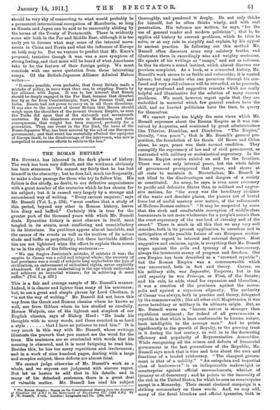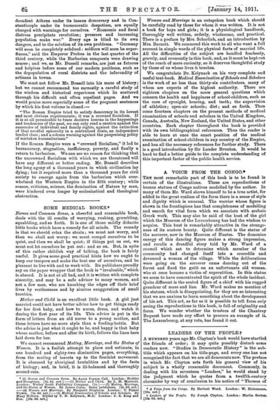THE ROMAN EMPIRE.* Mn. BUSSELL has laboured in the dark
places of history. The work has been very difficult, and the workman obviously has been strenuous. We cannot say fairly that he has lost himself in the obscurity; but he does fail, much too frequently, to make a clear passage for those who try to follow him. His failure is due chiefly, no doubt, to our defective acquaintance with a great number of the centuries which he has chosen for his subject; but it is caused very largely by a strange and encumbered way of writing. "Every earnest enquirer," says Mr. Bussell (VoL L, p. 234), "must confess that a study of this period, beyond any other in Roman history, leaves him dizzy and baffled." Certainly this is true for the greater part of the thousand years with which Mr. Bussell deals. Byzantine history is most obscure in itself, most tangled in its events, most conflicting and unsatisfactory in its historians. Its problems appear almost insoluble, and the causes of its events as well as the motives of its actors elude and baffle us perpetually; but these inevitable difficul- ties are not lightened when the effort to explain them comes to us in the style of the following sentences :—
" We can forgive Justinian's mistake, if mistake it was; the empire to Caesar was a solid and integral whole; the recovery of lost provinces was a recall of subjects long neglected to the joys of civilization, an enforcement of undoubted rights, never explicitly abandoned. Of no great undertaking is the age which undertakes and achieves an impartial witness; for in achieving it must suffer." (Vol. I., p. 222.) This is a fair and average sample of Mr. Bussell's manner. Indeed, it is clearer and lighter than many of his sentences ; but, to use a great and simple phrase by Lord Chatham, it "is not the way of writing." Mr. Bassett did not learn this way from the Greek and Roman classics whom he knows so well, nor from Gibbon whom he has studied so carefully. Horace Walpole, one of the lightest and simplest of our English classics, says of Bishop Hurd : "He loads his thoughts with so many words, and those couched in so hard
a style that I have no patience to read him." It is very much in this way with Mr. Bussell, whose writings illustrate the proverb that you cannot see the wood for the trees. His sentences are so overloaded with words that his meaning is obscured, and it is most fatiguing to read him. Besides this, he has too many repetitions and irrelevances ; and in a work of nine hundred pages, dealing with a large and complex subject, these defects are almost fatal.
We cannot judge otherwise of Mr. Bussell's work as a whole, and we express our judgment with sincere regret. But let us hasten to add that in his details, and in many of his detached sentences, there is a great deal of valuable matter. Mr. Bussell has read his subject • The Roman ors Essays on the Constitutional History from the Accession of Domitian (81 A.D.) to the Retirement of lficephorus III. (1081 A.D.) By R .W. Russell. 2 vols. London: Longmans and Co. [Ws. net. .1
thoroughly, and pondered it deeply. He not only thinks for himself, but he often thinks wisely, and with real penetration. His volumes are written, he says, "for the use of general reader and modern politician" ; that is, he applies old history to current problems, which he tries to solve, or at any rate to simplify and explain, by his appeal to ancient practice. In following out this method Mr. Bussell often discovers some very salutary truths, and illustrates them in exceedingly wise and weighty sentences. He speaks of his writings as "essays," and not as volumes. In this he shows a sound instinct, which almost disarms our previous complaint. As a book, as a connected history, Mr. Bussell's work seems to us feeble and vulnerable; it is wasted labour; but any reader who can persevere through his con- fused and very solid volumes will be rewarded, as he proceeds, by many profound and suggestive remarks which are really helpful and illuminative for the solution of many current problems. We must, however, regret again that they are embedded in material which few general readers have the skill, and no hurried politicians have the time, to quarry for themselves.
We cannot praise too highly the sane views which Mr. Bissell expresses about the Roman Empire as it was con- ceived by Augustus, and continued by great administrators like Tiberius, Domitian, and Diocletian. " The Empire," literally, "was peace "; that is Mr. Bussell's general pro- position, the foundation of his thesis. Of Rome and China alone, he says, peace was their normal condition. They exemplify the supremacy of law and of civil government, as contrasted with military or ecclesiastical supremacy. In the Roman Empire armies existed on and for the frontiers. There was not only internal peace, but the whole fabric of government presupposed that peace, and strove at all costs to maintain it. Nevertheless, Mr. Bussell is not blind to the disadvantages and dangers of a society so constituted. An army, he says, is even more necessary to pacific and defensive States than to militant and aggres- sive nations, for "the army was the hereditary civilizer of the waste and desolate places, the pioneer not of brutal force but of useful mastery over nature, of the refinements of Helleno-Roman culture." "It may be suspected by some that the sleek and comfortable corruption of middle-class bureaucrats is not more wholesome for a people's morals than the overt supremacy of the war-lord of chivalry and of the sword." There is much in all this that we may very well consider, both in its present application to ourselves and in anticipation of the possible future of our European civilisa- tion, with regard to internal and external dangers. Most suggestive and ominous, again, is everything that Mr. Bussell urges against the evils and tyranny of a bureaucracy, always the inveterate enemy of progress and freedom. Our own Empire has been described as a "crowned republic " ; but the Roman Empire was a commonwealth which was uncrowned, both in fact and theory. Caesar, on his military side, was Imperater, Emperor; but in his civil capacity he was Prineeps, or First, of the Senate ; and his rule, he adds, stood for expansion and liberalism ; it was a reaction of the provinces against the metro- polis and against a rapacious oligarchy. The authority of Caesar was always, both in practice and theory, delegated by the commonwealth ; like all other civil Magistracies, it was never hereditary or military in its ultimate origin. But, as Mr. Bussell warns us, " human nature is stronger than republican sentiment ; for indeed of all governments a republic is that which is least conformable to human nature, least intelligible to the average man." And he points significantly to the growth of Royalty, to the growing trust in it during the last century, as well as to the decreasing efficiency and popularity of Representative Assemblies. While recognising all the crimes and defects of Senatorial government in the last generations of the Republic, Mr. Bussell says much that is wise and true about the uses and functions of a landed aristocracy. " The cheapest govern- ment is that of a nobility." "An outspoken and impartial class of landowners" is an indispensable makeweight or counterpoise against official encroachments, whether of tyranny or of democracy ; and he points to the immunity of the rich in the United States, for which be sees no counterpoise except in a Monarchy. Their recent electoral campaign is a striking commentary on these words. And, we may add, many of the fiscal blunders and official tyrannies, both in
decadent Athens under its insane democracy and in Con- stantinople under its bureaucratic despotism, are equally charged with warnings for ourselves. "Economic and fiscal distress precipitate revolution; pressure and increasing population make war." Every age is blind to its own dangers, and to the solution of its own problems. " Germany will soon be completely subdued : soldiers will soon be super- fluous," said the Emperor Probus in the last quarter of the third century, while the Barbarian conquests were drawing nearer ; and we, as Mr. Bussell remarks, are just as fatuous and helpless before some of our modern problems, such as the depopulation of rural districts and the infecundity of artisans in towns.
We must not follow Mr. Bussell into his maze of history; but we cannot recommend too earnestly a careful study of the wisdom and historical experience which lie scattered through his difficult and often repellent pages. And we would praise more especially some of the pregnant sentences by which his first volume is closed:—
" The Roman Empire tried to satisfy democracy in its lowest and most obvious requirements ; it was a crowned Socialism. If it is at all permissible to trace decisive lessons in the happenings and tendencies of the past, wo can only read a caution against the surrender of individual and family rights, against the extinction of that needful ephoralty in a centralised State, an independent landed class ; and a solemn warning against the pauperising policy of mistaken humanitarians."
If the Roman Empire were a "crowned Socialism," it led to bureaucracy, stagnation, inefficiency, poverty, and finally a return to barbarism. We can see no reason for thinking that the uncrowned Socialism with which we are threatened will have any different or better ending. Mr. Bussell describes the long agony of a thousand years in which civilisation lay dying; but it required more than a thousand years for civil society to emerge again from the barbarism which over- whelmed the Western Empire in the fifth century ; while reason, criticism, science, the domination of Nature by man, were hindered even longer by ecclesiastical and theological obstruction.







































 Previous page
Previous page